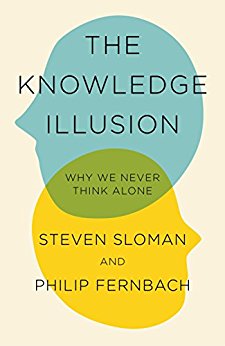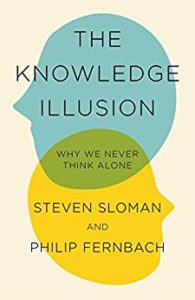—Steve Richards reviews “The Knowledge Illusion” by Steven Sloman and Philip Fernbach
Imagine a book that upsets your world in a way that is also comforting and encouraging. The Knowledge Illusion by Steven Sloman and Philip Fernbach convincingly argues that we don’t know as much as we think we do. Yet that is what enables individuals and societies to very effectively act in ways that are both wonderful and terrible. The authors gather cognitive, linguistic, social and psychological sciences so we may better understand our own mind.
It starts with the evolutionary question: What is the purpose of thought? To enable action. Thinking allows us to effectively act on our needs, intentions, and desires. We fine tune how we respond to our sense of the world around us. Is our description of that world based on gut reaction or accurate description of cause and effect?
We know much less than we think we do. That’s because our mind is not contained in our brain. Our mind is a remarkable network extending far beyond our skull. We manage our access to information and reminders that reside in people and objects that surround us. So, when we think, remember and act, we are aided by the communities and tools we associate with. Intelligence is a property of teams, not individuals.
The results are illusions that we know more, can explain in greater depth, and understand more than is in fact the case. This is commonly revealed when we are challenged to go into detail. In fact, we think and function in communities, taking advantage of skills and knowledge far beyond what resides in our own brain. Technologies are not replacing people so much as connecting us.
Life is complex. We lack the time and energy to give detailed attention or be expert in everything. We make choices, relying on the experience and judgement of, hopefully trustworthy, others. We sway between intuition and thoughtful reflection. Can we manage our choices so that beliefs, values, and community culture do not overwhelm evidence and reason? “Our shared pursuits are always growing more complex and our shared intelligence more powerful.”
Decision making is a communal process. Intuitive response is efficient. We can respond in matters of critical survival and routine tasks. Thoughtful reflection and analysis are called for by the unfamiliar and complex. Balancing intuition and reflection fertilize creativity. Do we recognize what is at stake?
Familiar examples help to focus the deep and broad significance of this book. It makes sense of so much of our daily puzzles and “aha’s.” It gently reassures me when annoyed by a seeming brain-lapse; this is how our mind really works. “Recognizing and dealing with what we don’t know can be more effective than knowing.”
–Steve Richards


